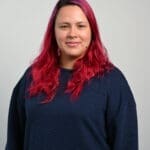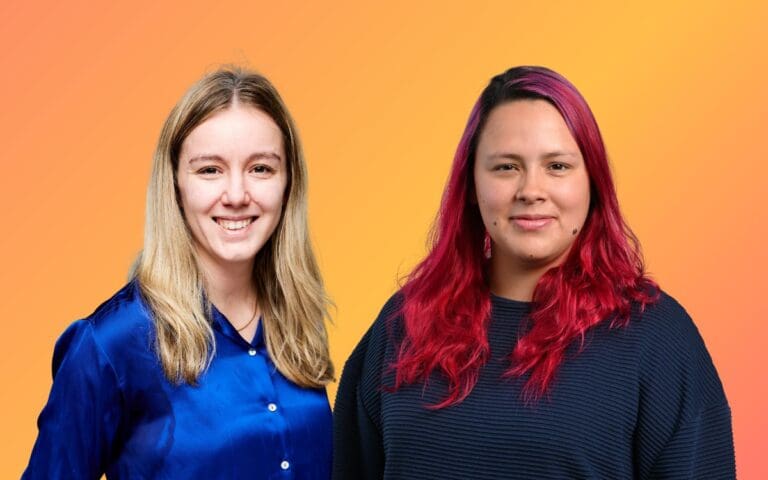Tell us about your journey into quantum engineering – what inspired you to enter the field, and how did you transition from academia into industry?
 “My journey into quantum engineering wasn’t linear,” says Florence, “I was driven by a love of mathematics and astronomy—I even wanted to become an astronaut! I discovered I preferred laboratory work while studying experimental astrophysics at Imperial College London. There’s something incredibly satisfying about hands-on experimentation – I enjoy the practical aspects of problem-solving and the excitement of watching experiments unfold in real-time. At Imperial, I gained valuable experience with vacuum systems, which are crucial in quantum applications.
“My journey into quantum engineering wasn’t linear,” says Florence, “I was driven by a love of mathematics and astronomy—I even wanted to become an astronaut! I discovered I preferred laboratory work while studying experimental astrophysics at Imperial College London. There’s something incredibly satisfying about hands-on experimentation – I enjoy the practical aspects of problem-solving and the excitement of watching experiments unfold in real-time. At Imperial, I gained valuable experience with vacuum systems, which are crucial in quantum applications.
Following a transition from academia, I interviewed at Aquark, where I was immediately impressed by the team and their innovative work. The opportunity to work in a lab with talented individuals while tackling new challenges in quantum technology was too exciting to pass up.”
 “Science has also fascinated me since childhood,” says Lauren, “starting with space books, progressing to the “Horrible Science” series, and eventually watching YouTube videos explaining quantum physics concepts.
“Science has also fascinated me since childhood,” says Lauren, “starting with space books, progressing to the “Horrible Science” series, and eventually watching YouTube videos explaining quantum physics concepts.
During my undergraduate and master’s studies, I was fortunate to participate in experimental projects and summer placements in a quantum group, which demystified what actual quantum research and labs look like. After my PhD in integrated photonics, I faced challenges in the industry, starting as a test engineer before finding a more fulfilling R&D role. Now at Aquark, I work as a photonics engineer that combines all of my interests in quantum and integrated photonics.”
What misconceptions did you encounter about working in quantum technology, and how has your experience challenged these?
Lauren: “Working in quantum physics has the reputation of being like rocket science – the word ‘quantum’ comes with the connotation that it’s impossibly challenging. But it doesn’t have to be so intimidating—quantum mechanics is used every day in LEDs and lasers, and while much remains to be figured out, isn’t that exciting?”
“Agreed – no one should discount themselves from working with quantum technologies because they think it sounds too difficult,” Florence responds, “in reality, it’s a highly collaborative field requiring diverse skills. My role as a Lead Vacuum Engineer is proof that diverse skills and interdisciplinary work are essential.”
What are some of the biggest challenges you’ve faced and how did you overcome them?
“My challenges relate more broadly to being a woman in male-dominated fields rather than specifically to quantum or engineering,” says Lauren, “I’ve been lucky to work with wonderful colleagues and have encountered only a few gender-related issues. If something makes you uncomfortable, open up to someone you trust before approaching a supervisor or manager to build confidence in addressing the issue.”
“I would say that navigating physics, a historically male-dominated field, can be isolating when you’re one of few women in the room,” Florence says, “In a previous job, I witnessed the consequences of unconscious bias from those in leadership positions. It was disheartening to see others denied opportunities through no fault of their own – it strengthened my determination to promote inclusivity and ensure all voices are given equal opportunities.
I’ve been fortunate to have mentors who acknowledged these challenges, which really made a difference to my confidence. I encourage any woman in the industry to seek supportive communities and guidance from mentors!”
What opportunities are there in quantum, and why is having diverse perspectives crucial for its development?
Florence: “As quantum technology commercialises, opportunities will emerge across multiple sectors. Maximising applications and discovering new ones will require cross-disciplinary collaboration. Innovation and effective problem-solving thrive with diverse teams, as different viewpoints uncover opportunities and solutions that might otherwise be missed. Without diversity in cultural background, research expertise, and other human factors, key insights and breakthroughs will be overlooked.”
Lauren agrees: “Working with people from diverse backgrounds has introduced new approaches to non-technical problems. Creating diverse teams ensures you can hire the best talent.”
In your experience, what are some effective ways to develop your technical skills? Are there particular resources you’ve found valuable?
Florence: “Take every opportunity you can to expand your skill set! I’ve tried things I wasn’t good at, which helped me understand what wasn’t for me. Most importantly, ask the people around you: your teachers, tutors and classmates – they will be happy to share their knowledge with you!”
“Read as much as you can on the sector you’re most interested in,” says Lauren, “I’ve gained knowledge about current industry and research trends through social media, news sites, and LinkedIn. I then use simulation tools to experiment with what I’ve read, developing a more intuitive understanding.”
What advice would you give to women who might be intimidated by the quantum field but are interested in pursuing it as a career?
Lauren: “Don’t be intimidated by the word ‘quantum’. Instead, ask yourself this: Do you find it interesting? Do you enjoy problem-solving? Can you use skills you enjoy? If so, go for it! Also, some companies ship lab equipment with free snack boxes—the best incentive!”
“I agree” Florence says, “Keep going. In all new technologies, someone will be the first, so why not you? Everyone in tech started as a beginner. If you have the drive to learn and develop your skills, you absolutely belong here – make sure to pursue it!
Most importantly, be kind to yourself and recognise that every journey is unique. Lean into your strengths and use them to your advantage – it’s important to advocate for yourself and not fear requesting adjustments that support your productivity and well-being.”



